Growing and learning
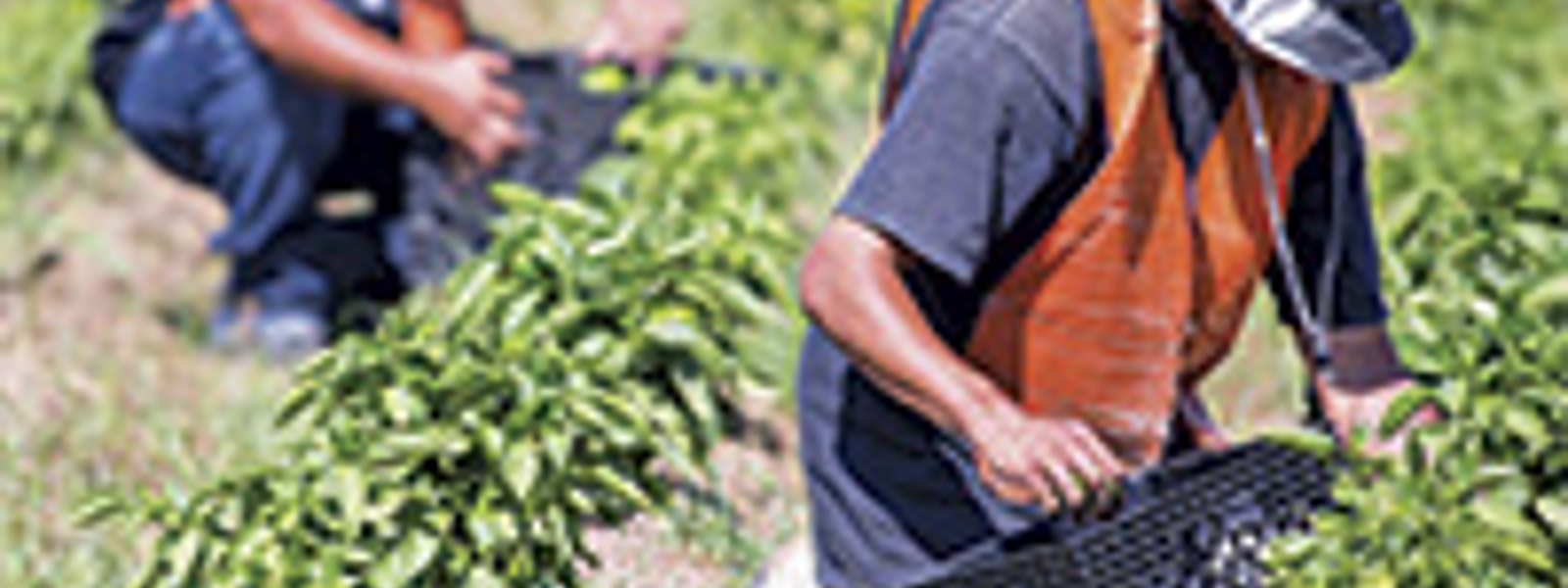
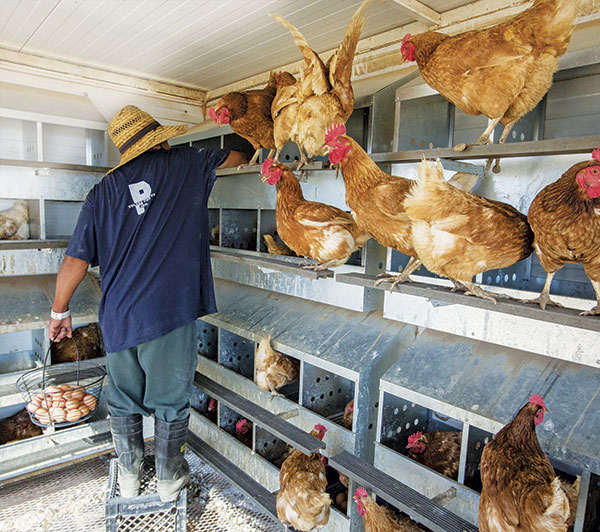
A Tulare County jail inmate harvests eggs in the jail farm's chicken coop, which has nearly eliminated the need to buy eggs for the kitchen. Photo: © 2017 Tomas Ovalle
Inmates in Tulare County are trading prison garb for work gloves and time behind bars for a chance to grow a better future—while growing their own food.
Participants in the county's innovative jail farm program keep themselves and their peers fed, saving taxpayers a significant amount of money. And they can use the experience to find work once they pay their debts to society.
An inmate-operated farm and garden serves the Bob Wiley Detention Facility in Visalia, the main jail of the Tulare County Sheriff's Department, and the county's other three jails. Here, inmates raise and care for crops and livestock, and learn how to turn them into meals.
"We live in a predominately agricultural-based community in Tulare County anyway," Sheriff Mike Boudreaux said. "We're considered the breadbasket of the world. It just seemed like a perfect fit."
The operation started as "just a little tiny farm," said Tom Guinn, who became a sheriff's deputy in 1988 and took over as farm manager in 1992.
Boudreaux said his department soon recognized the potential for savings.
"We began (employing) the inmates on the farm, and we began to realize as well that there are rehabilitation benefits to having the inmates actually working and learning a trade," he said.
Now, the farm—three-quarters of a mile down the road from the jail—spans 1,100 acres. Guinn and his assistants work with minimum-security inmates from the jail and with convicts who, given options, have chosen working at the farm over ankle monitoring or jail time. A crew of about 50 works there each day.
"We farm 420 (acres); the rest is grazing," Guinn said. Inmates grow alfalfa, sudangrass and winter wheat, which becomes feed for the livestock.
The vegetable garden supplies about 150 pounds of vegetables per year, Guinn said. In the spring and summer, the garden produces squash, cucumbers, jalapeño and bell peppers, three kinds of tomatoes, watermelons, cantaloupes and sweet corn. In winter, the gardeners grow broccoli, cabbage, cauliflower, onions, garlic and lettuce. The farm also has its own greenhouse, Guinn said, where inmates with physical impairments plant seeds for the upcoming season's crops.
The farm has about 400 head of cattle and 640 hogs, and operates its own slaughterhouse with weekly operations alternating between 15 hogs and five head of beef. That works out to about 3,000 pounds of meat per week, Guinn said.
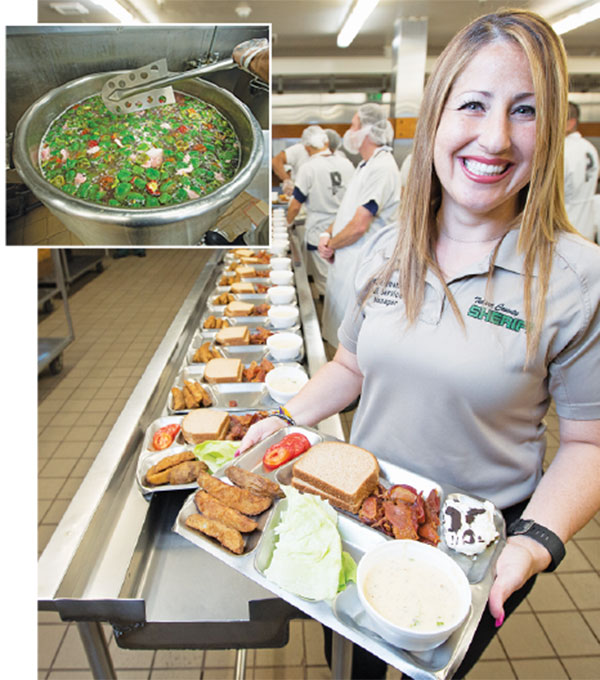
Jail kitchen manager Karrie Donabed displays a meal prepared with ingredients grown by inmates. Chili verde (inset) is among the dishes that feature ingredients from the jail farm. Photos: © 2017 Tomas Ovalle
Cooking what they grow
All that goes to the kitchen at the Bob Wiley facility. Manager Karrie Donabed's crew cooks for the 1,600 to 1,800 inmates of all four Tulare County jails. Two shifts of 21 inmates each work the kitchen.
The Wiley kitchen prepares dishes including beans, chili verde, beef patties, ground pork stew and spaghetti with meat sauce, according to Tierra Stewart, food and laundry services manager. Fresh vegetables such as peppers and potatoes are added to the beans, while peppers and onions go into the chili verde to make the meals more flavorful and nutritious, she said.
In the kitchen, recipe creativity is encouraged.
"We make everything from scratch," including desserts, Stewart said. "When an inmate starts working in the kitchen, he or she may not know how to read a recipe, but over time they learn a trade that could someday get them a job."
Inmates working in the kitchen learn about cooking, food safety, food preparation, cooking in large batches and how to plan meals for people with diabetes or kidney problems. Those skills could be put to use at a hospital or nursing home, Stewart said.
"They learn a marketable skill to use after they leave custody," she said.
Stewart said the kitchen tries not to create too many leftovers. If there are any, they go right back to the farm as hog feed.
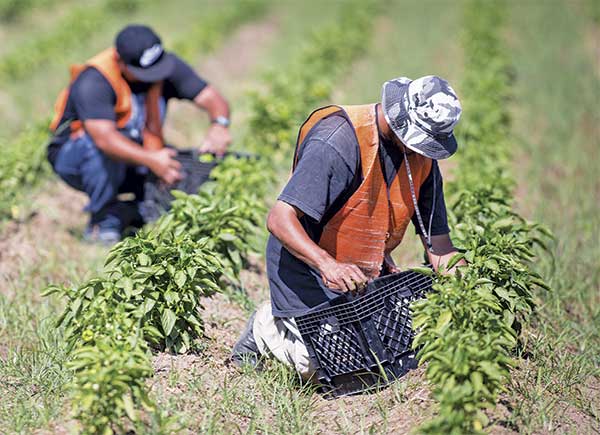
The jail farm's garden supplies fresh vegetables, such as peppers, tomatoes, corn, lettuce and cabbage, and provides valuable work experience to inmates. Many who work in the garden are serving no jail time, instead working off their sentences growing food. Photo: © 2017 Tomas Ovalle
An idea hatches
A trip to the grocery store a few years ago gave Boudreaux the idea for a recent addition: chickens.
"I was in the market with my children, and I noticed that one week egg prices were about $1.99 a dozen," he said. "The following week, we go in, egg prices are $5.99 a dozen. Very quickly, my mind went to: How many eggs are we serving inmates a day, and how much are we spending a year?"
His undersheriff told him the kitchen cracked about 2,000 eggs a day at a cost of about $150,000 annually. Boudreaux's next question: Can we get our own chicken farm? Done. Guinn said the chickens supply about 1,700 eggs a day at present, but 2,000 is the goal.
Food also comes from other sources. Tulare County fruit growers will inevitably have product that's unsalable because of cosmetic imperfections. The jail will take the so-called ugly produce off the farmers' hands at no cost, in a process known as gleaning.
"We'll take thousands of pounds of fresh fruit that couldn't be sold at market, and we get that from those surrounding ranchers and farmers that give it to us, and we'll put a fresh nectarine on an inmate's tray oftentimes," Boudreaux said. His jail will also take plums and apples when available, he said.
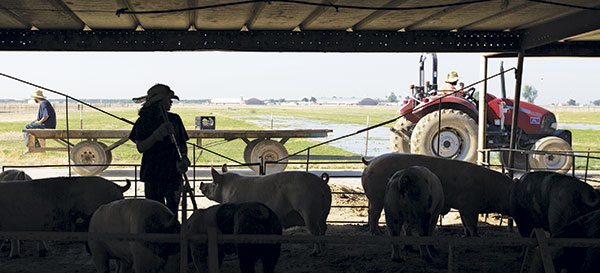
The farm is home to more than 600 hogs. Sheriff's Department employees say the skills inmates learn by caring for animals and raising crops can be used to find employment once they have served their sentences. Photo: © 2017 Tomas Ovalle
Planning to diversify
Boudreaux said the department now is looking at another parcel of land for expansion. He's also considering adding a dairy to the mix.
"I'd love to be able to get milk and dairy products up and running for the inmates—have them learning how to deal with dairy cows, milk," Boudreaux said.
Dairies are expensive to operate, he said. Options being considered include building a small one on the property—the department doesn't know the cost of that yet—or leasing an idle dairy. Either way, Boudreaux has offers from local dairy farmers to donate cows and teach inmates how to do the work.
"What a great story that would read if we could have inmates that were rehabilitated, moved from this program, went to their local dairy, found a job, started working and never came back again," he said.
Dairies with "Help Wanted" signs won't be hard to find—with about 245 dairies in Tulare County, milk is its top commodity.
The farm at Bob Wiley Detention Facility saves Tulare County nearly $1 million per year on food expenses, Boudreaux said.
"What that does is, it allows the sheriff to hire a new deputy if need be, or purchase body cams or computers—frees up his budget a little bit," Guinn said. "Also, the big goal is to let the taxpayers know we're trying to save them money."
In fact, sometimes the jail farm makes a little money. Hay that isn't needed by the livestock is sold on the open market; from January to July this year, the jail farm was able to feed all its cattle and sell $80,000 worth of hay, Boudreaux said. The proceeds were plowed back into the farm.
The farm also gives back to the community. Guinn said the farm has worked with FoodLink, a local food bank, and with Senior Gleaners, a group dedicated to making sure the elderly have access to fresh produce.
"They love our tomatoes, our onions," Guinn said of Senior Gleaners. "There's several little things we grow a surplus of that we can't use all of, and they'll in turn get some carrots for us."
If the Tulare County sheriff had no farm, the department would have to spend more of its budget buying food from vendors to feed inmates, Stewart said.
"I prefer to use what's on the farm," she said. "It's fresh and it tastes better."

